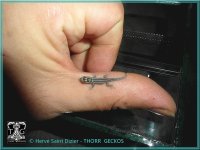ColdFire6778
New member
I've really wanted a flying gecko, but I've also been considering day geckos. They both are just so adorable, amazing, and unique in their own ways, but the important thing is which one is right for me. Here are some factors for which one I should get:
- I am thinking of getting an 18x18x24 tall exoterra terrarium for it
- I'm not planning on getting extra heating devices (besides a heat lamp or heat pad)
-not planning on getting any cooling devices
-I don't think either of these can live off those gecko diet things like crested geckos, but if one of them can that sounds good but if neither do that's fine-as long as crickets will do.
-I can't spend too much money on all different supplies they need-what I mean is, which one will I end spending more on in the long run?
-as mentioned above, I can't spend too much, but not only on the supplies, but also the animal itself. Is one usually considerably more money than the other?
-I can mist the cage frequently daily, so humidity isn't much of a problem for me, unless I need to buy all this extra crazy equipment as for if it requires a really high humidity (I don't think this is a problem for either the flying or day gecko though so this isn't really important to answer)
-I don't need to be able to hold them, especially since I know flying geckos have fragile skin flaps, but if day geckos can tolerate a little bit of handling that's cool and if anyone could tell me that would be appreciated
I think that's pretty much the main things, thank you in advance for any help as it is gladly appreciated!!! (Also thanks for being patient with me, I'm just trying to make sure I can set up the best home possible for the best gecko most fit for me :biggrin:
:biggrin:
P.S. I know there are 2 types of flying geckos and a TON of day gecko types. If you recommended either flying gecko or day gecko for me, if you could list a few different types of flying/day gecko that seem to fit my list above the best it would be greatly appreciated thanks again! ;-)
thanks again! ;-)
P.P.S I know a few of you may have seen my other thread about flying geckos so you may be thinking, "I thought she was sure about getting a flying gecko! Where did this random question of day geckos come in!?" I'm sorry about how random that was-like I already said above, I'm just trying to make sure I make the best decision on a gecko that's best for me. . Just please bear with me here-like the title says I'm new to geckos and don't want to make a descision that could get the gecko or even me into a bad situation.
. Just please bear with me here-like the title says I'm new to geckos and don't want to make a descision that could get the gecko or even me into a bad situation.
- I am thinking of getting an 18x18x24 tall exoterra terrarium for it
- I'm not planning on getting extra heating devices (besides a heat lamp or heat pad)
-not planning on getting any cooling devices
-I don't think either of these can live off those gecko diet things like crested geckos, but if one of them can that sounds good but if neither do that's fine-as long as crickets will do.
-I can't spend too much money on all different supplies they need-what I mean is, which one will I end spending more on in the long run?
-as mentioned above, I can't spend too much, but not only on the supplies, but also the animal itself. Is one usually considerably more money than the other?
-I can mist the cage frequently daily, so humidity isn't much of a problem for me, unless I need to buy all this extra crazy equipment as for if it requires a really high humidity (I don't think this is a problem for either the flying or day gecko though so this isn't really important to answer)
-I don't need to be able to hold them, especially since I know flying geckos have fragile skin flaps, but if day geckos can tolerate a little bit of handling that's cool and if anyone could tell me that would be appreciated
I think that's pretty much the main things, thank you in advance for any help as it is gladly appreciated!!! (Also thanks for being patient with me, I'm just trying to make sure I can set up the best home possible for the best gecko most fit for me
P.S. I know there are 2 types of flying geckos and a TON of day gecko types. If you recommended either flying gecko or day gecko for me, if you could list a few different types of flying/day gecko that seem to fit my list above the best it would be greatly appreciated
P.P.S I know a few of you may have seen my other thread about flying geckos so you may be thinking, "I thought she was sure about getting a flying gecko! Where did this random question of day geckos come in!?" I'm sorry about how random that was-like I already said above, I'm just trying to make sure I make the best decision on a gecko that's best for me.
Last edited:


![DSCN1189[1].jpg DSCN1189[1].jpg](https://www.geckosunlimited.com/community/data/attachments/25/25076-f1a99f26fe8d24dc12f83af1b7064088.jpg)
